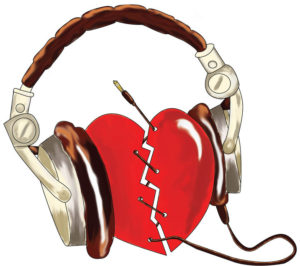 “Music hath charms to soothe a savage breast.” At one point or another, I’m sure you’ve heard this phrase, though most of us have heard it misquoted as, “Music hath charms to soothe the savage beast.” Regardless of how we recount William Congreve’s words from his 1697 tragedy, The Mourning Bride, it’s long been known that music most assuredly has the power to sway the heart. But what about a heart that’s broken? Why are we compelled to listen to songs of sadness and loss when we are already drowning in an ocean of despair?
“Music hath charms to soothe a savage breast.” At one point or another, I’m sure you’ve heard this phrase, though most of us have heard it misquoted as, “Music hath charms to soothe the savage beast.” Regardless of how we recount William Congreve’s words from his 1697 tragedy, The Mourning Bride, it’s long been known that music most assuredly has the power to sway the heart. But what about a heart that’s broken? Why are we compelled to listen to songs of sadness and loss when we are already drowning in an ocean of despair?
Believe it or not, when we are feeling forlorn, it can actually be beneficial to listen to songs that mirror the emotions we are experiencing. In fact, a number of recent studies have discovered that people who are feeling down and dejected not only feel a sense of pleasure when listening to “sad songs,” they actually feel better! “Why?” you might wonder. The original theory was that those weathering depression or experiencing deep  sadness, enjoyed being “down in the dumps,” and, therefore, listened to sad music to prolong their agony. However, that theory has recently been turned on its ear with new light being shed on a better understanding of depression and grief. Part of that understanding is the realization that it’s not so much that we enjoy being sad, it’s that we enjoy hearing someone else sharing their pain, a similar pain, thus knowing we are not the only person, or people, to be feeling what we are feeling. In short; we long to know that we are not alone. So even when we crave solitude, we still, on some baser level, long to know that our suffering is not relegated solely to us in our crestfallen microcosm.
sadness, enjoyed being “down in the dumps,” and, therefore, listened to sad music to prolong their agony. However, that theory has recently been turned on its ear with new light being shed on a better understanding of depression and grief. Part of that understanding is the realization that it’s not so much that we enjoy being sad, it’s that we enjoy hearing someone else sharing their pain, a similar pain, thus knowing we are not the only person, or people, to be feeling what we are feeling. In short; we long to know that we are not alone. So even when we crave solitude, we still, on some baser level, long to know that our suffering is not relegated solely to us in our crestfallen microcosm.
I remember the myriad of occasions when Julia, my narcissist, and I broke up (the discard phase), I listened to so many songs that echoed the feelings of abandonment and alienation I found suddenly thrust upon me. From Evanescence’s Missing and My Immortal, to Lykke Li’s Sleeping Alone and Love Me Like I’m Not Made of Stone, to Adele’s Someone Like You. I felt a connection with the artist and their pain, a oneness that reassured me, no matter how alone I felt, I wasn’t. And, in some roundabout way, I felt that Julia was there with me, her essence a silent presence in the deafening echoes of her absence. There were so many days on my drive into the office, or on the way home, I shared my pain with my artist of choice for the journey – generally, it was Evanescence. But as I began healing from the most recent in a plethora of discard phases, and now my final discard phase, I found myself listening less and less to those sympathetic and empathetic songs, and more and more to songs that were supportive of my decision to walk away from my narcissist and her manipulative abuse. Songs that reassured me things not only were getting better but that they were going to actually be okay. At the time, I didn’t realize it but that subtle, subconscious paradigm shift was a reflection of my healing.
pain, a oneness that reassured me, no matter how alone I felt, I wasn’t. And, in some roundabout way, I felt that Julia was there with me, her essence a silent presence in the deafening echoes of her absence. There were so many days on my drive into the office, or on the way home, I shared my pain with my artist of choice for the journey – generally, it was Evanescence. But as I began healing from the most recent in a plethora of discard phases, and now my final discard phase, I found myself listening less and less to those sympathetic and empathetic songs, and more and more to songs that were supportive of my decision to walk away from my narcissist and her manipulative abuse. Songs that reassured me things not only were getting better but that they were going to actually be okay. At the time, I didn’t realize it but that subtle, subconscious paradigm shift was a reflection of my healing.
Julia’s and my song was John Legend’s All of Me. We often laughed about how we felt John’s song much more realistically represented the trials and tribulations of a relationship versus the overly optimistic manner in which love and relationships were represented in other (equally fantastic) songs such as Bruno Mars Just the Way You Are or Colbie Caillat’s Bubbly. With slight chagrin, I’ll admit to putting “our song” on repeat and taking the long way home more days than I care to confess, lamenting (what at the time I perceived as) a devastating loss. However, as time wore on, I found myself gravitating toward songs that better reflected my healing heart and mending psyche, empowering songs that were supportive of my decision to leave such as Soft Cell’s Tainted Love, the Eurythmics You Have Placed a Chill in My Heart and Thorn in My Side (a personal favorite) and, most recently, Brand New Day.
You see, beautiful, when we hurt, even though we might solicit solitude and crave quiet, we still long to know that we are not as alone as we might feel in whatever hell torments us. I came to realize, many years ago, that 99% of the music I listen to doesn’t so much affect my mood or emotional state as it mirrors or reflects how I am feeling in that moment. I suspect, as a fellow empath, yours is the same heart, stirred by sonnet and song, moved to tears by a melody once embraced. So what about you? What was “your song” for you and your narcissist? And, if you are farther down that path to healing, what are some songs you have been listening to that have been a source of strength and solidarity? Please share with us. Tell us which artist/s and songs have given you the understanding you needed through lyric and verse to know that you are not alone in your pain, and the fortitude to carry on when you didn’t feel as though you could go another step? We’re listening. ?
state as it mirrors or reflects how I am feeling in that moment. I suspect, as a fellow empath, yours is the same heart, stirred by sonnet and song, moved to tears by a melody once embraced. So what about you? What was “your song” for you and your narcissist? And, if you are farther down that path to healing, what are some songs you have been listening to that have been a source of strength and solidarity? Please share with us. Tell us which artist/s and songs have given you the understanding you needed through lyric and verse to know that you are not alone in your pain, and the fortitude to carry on when you didn’t feel as though you could go another step? We’re listening. ?


Feel free to comment below! ?